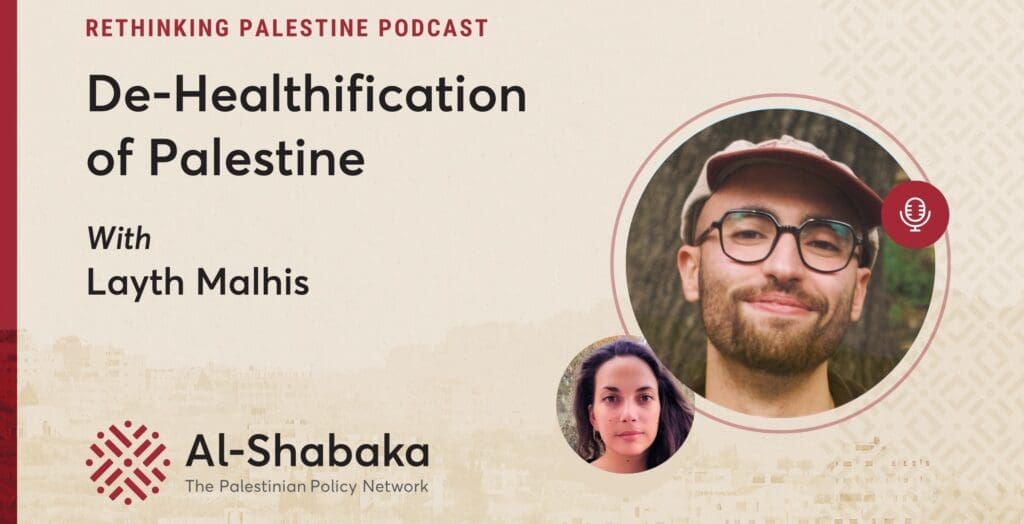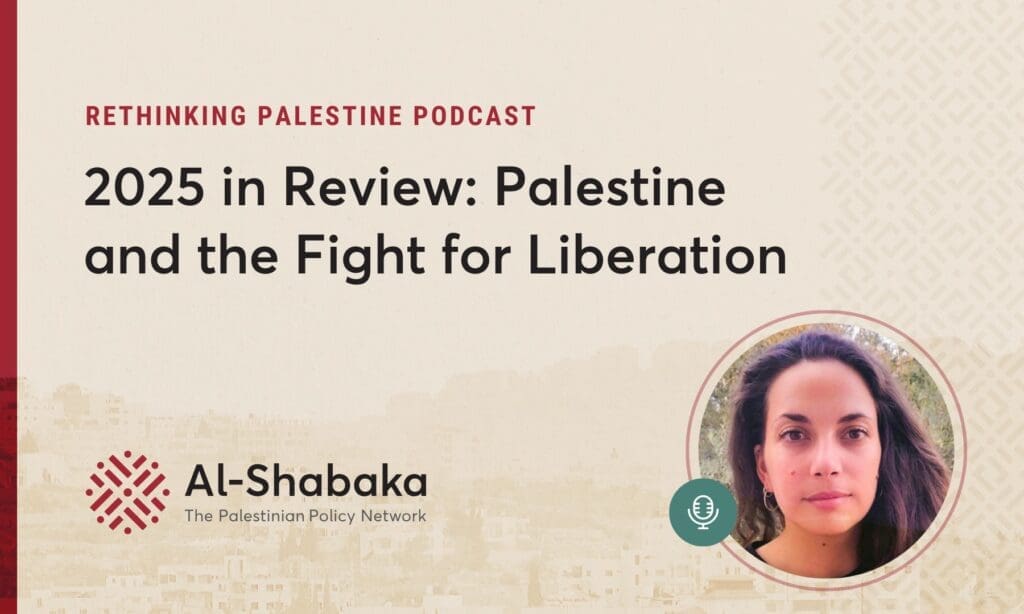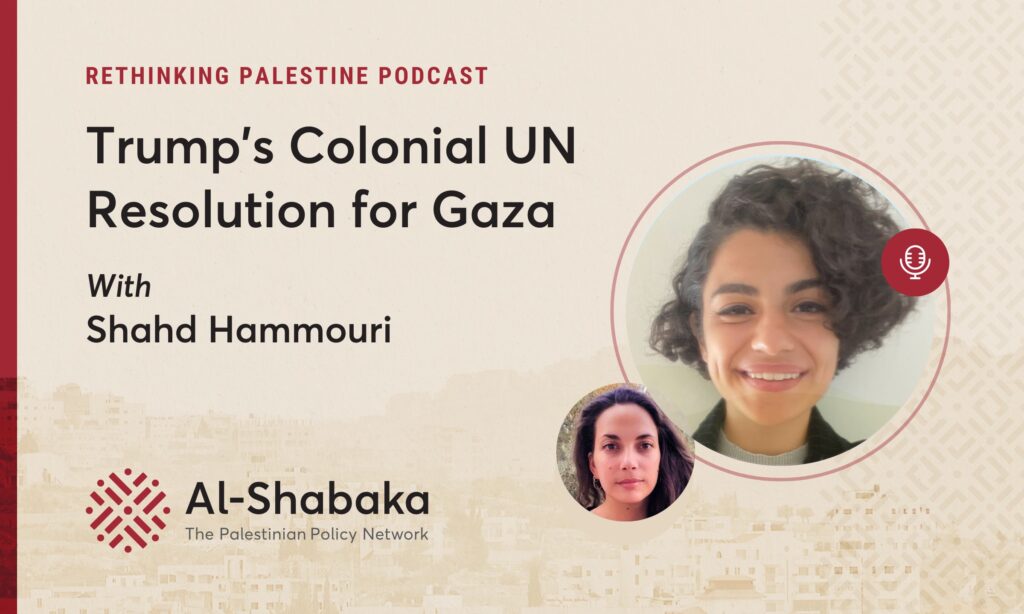About This Episode
Episode Transcript
The transcript below has been lightly edited for brevity and clarity.
Ali 0:00
Life in Egypt for the Palestinians from Gaza is mixed — of relief and hardship. We are grateful for the safety and the opportunity we have, but the constant struggle to make ends meet, find housing, and deal with the legal uncertainties makes it tough. It is a constant source of anxiety. We are just trying to hold onto hope, to find a way to build a better future despite these challenges.
Yara Hawari 0:32
From Al-Shabaka, the Palestinian Policy Network, I am Yara Hawari, and this is Rethinking Palestine.
Since the beginning of the genocide in Gaza, tens of thousands of forcibly displaced Palestinians have fled to Egypt in search of safety from Israeli regime bombardments. The journey is neither easy nor guaranteed. Prior to the invasion of Rafah in May 2024, thousands of Palestinians crossed, and there are all kinds of number estimates that range from 85,000 to 120,000. But it’s worth noting that it’s been difficult to ascertain precise numbers. What we do know is that most had to pay astronomical fees — at least $5,000 per adult — and only if their names were on coordination lists. Others were evacuated for medical treatment. Now the few that have made it across the Rafah border face uncertain and challenging circumstances in Egypt.
Indeed, there is no UN or international agency that has taken responsibility for them, forcing many to rely on grassroots and diaspora efforts to help pay for food and rent. Their futures, as are the futures of Palestinians in Gaza, remain precarious.
Joining us to shed light on this is humanitarian aid worker Ali. Ali, his wife, and young son were able to leave via the Rafah crossing in early May, just before its closure. Ali, thank you so much for joining me on this episode of Rethinking Palestine.
Ali 2:01
Thank you, Yara, for having me.
Yara Hawari 2:04
Ali, can you start by giving us an overview of Palestinian refugees in Egypt? Why are they there and what was the journey like for people who managed to get there?
Ali 2:13
For sure. First off, let’s be real — these folks are Palestinian refugees, and a lot of people don’t even recognize them as such. Their situation took a sharp turn for the worse after October 7th. Before this date, some Palestinians were already stuck in Cairo. They don’t have the paperwork to prove their status.
But let’s talk about their journey, especially after the 7th of October. Getting out through the Rafah crossing is a total nightmare. Imagine having to make a split-second decision to flee a war zone with zero guarantees, leaving Gaza, and saying goodbye to everything you have known, forever. From November to early December, those who managed to escape to Cairo had to come up with over $12,000 per person, even for the kids. And here’s the kicker — there are no guarantees. This money often went to coordinators who scammed families out of their money. Some people even paid extra, hoping it would speed things up, only to end up on a list connected to Egyptian nationalities.
But on the other hand, by mid-January, things were shifting a bit with the Ya Hala Company coming back. They charge a person $5,000 over 16 years old, and for the kids it’s $2,500. While it seemed more organized, it was still messy. There are thousands registering daily, but only 300 to 350 names get through each day because of the Israeli restrictions and security checks.
This journey is full of uncertainty and fear. Once you’re registered, there is no turning back, and you wait — like 20 to 30 days — holding your breath, hoping your name will get approval. Tragically, some people don’t survive the war long enough to see their name coming up.
Physically, the trip is brutal. Imagine having to leave with almost nothing, crossing dangerous, bombarded areas at Rafah crossing. After you finally get to the Palestinian side, you are stuck waiting four to eight hours on the Egyptian side under harsh conditions. You cannot move around or ask questions. And if you ask many times, you get shouted at, definitely. Some refugees had to walk over 10 kilometers from northern Gaza to the crossing, exhausted and in need of rest.
This journey is a testament to the resilience and strength of the human spirit amidst the suffering. It’s a journey filled with heartbreak, despair, and a flicker of hope for safety. These people are leaving behind their homes, their memories, and a huge part of their lives — all for a chance at survival. You know, all the people right now in Egypt are genocide survivors.
Yara Hawari 5:46
Ali, thank you for painting that picture for us. As I mentioned earlier, the estimated numbers of Palestinians from Gaza in Egypt are really difficult to ascertain. Why is that?
Ali 6:00
It’s definitely a challenge to nail down the exact number. The estimates are between 100,000 to 200,000 Palestinians from Gaza in Egypt. This estimate comes from the Ministry of Interior in Gaza. It likely includes a mix of people — those with Egyptian nationality, some who are sick or wounded, and the large group being those who came through the Ya Hala Company or other coordination.
But the bigger question is why we can’t get a solid number. For both the Egyptian authorities and the Palestinian Authority, releasing an official number is a huge moral and political burden. If they revealed the true figures, it would expose just how much money Palestinians had to pay to escape the war zone. Essentially, it would highlight that the Rafah crossing turned into a significant financial resource for the Egyptian authorities. Just think about it — the Ya Hala Company was reportedly making over $2 million daily just from these people trying to find safety. This financial exploitation is a major reason why everyone is trying to keep the number under wraps.
Admitting to this number means acknowledging the painful truth that the plight of these refugees has been turned into a profit-making venture. Furthermore, people are constantly moving, many have no proper documentation, and the entire situation is fluid and unstable.
However, with the Rafah crossing now closed, the situation for the Palestinians in Egypt has become more critical. I believe we will soon see this number coming out into the open. As the coordination worsens and international attention increases, there will be more pressure to address the needs of these refugees properly. The real number will likely be revealed as part of efforts to find a solution and to provide much-needed assistance.
In summary, the difficulty of getting an exact number of Palestinian refugees in Egypt is due to political, moral, and logistical factors. But as the crisis continues, the true scale of the issue will become impossible to hide, and addressing it will become a priority.
Yara Hawari 8:54
If you’re enjoying this podcast, please visit our website al-shabaka.org where you will find more Palestinian policy analysis and where you can join our mailing list and donate to support our work.
Thank you for explaining that to us. I think we’ll come on to the efforts to support Palestinians from Gaza in Egypt, but I wanted to first ask you about something you mentioned earlier — the status that Palestinians in Egypt have. As you mentioned, many of them begin on tourist visas, but there is no possibility to apply for residency or asylum or refugee status. So perhaps you can talk us through the different statuses that people have and what the possibilities are.
Ali 9:39
Absolutely. And let me tell you, it’s a tough and suffocating situation for us.
We don’t have any real residency status. What we’re getting is essentially an entry stamp extension for just 45 days, and this so-called residency allows us to move around within Egypt. But right now, all the Palestinians from Gaza are technically in violation because their 45-day period has expired. The last people who entered did so by the 8th of May. So by the time we are recording this podcast, everyone is overstaying their welcome.
Getting actual Egyptian residency is almost impossible. Whether you are a student or an investor, you need approval from Egyptian authorities. And let me tell you, almost all the applications get rejected. It’s like hitting a brick wall every single time.
So we are stuck — really stuck. We don’t have any rights. We cannot open bank accounts. We cannot receive money through Western Union. And forget about applying to travel anywhere, because we don’t have actual residency in Egypt. This situation is incredibly frustrating for all the Palestinians here.
It feels like starting from scratch, but that starting point never changes. It’s like being in a loop with no way out. To make matters worse, the responsibility for our situation falls on the Palestinian authorities. The Palestinian Embassy in Cairo is practically useless — they’re just a post office. They don’t help with anything.
Imagine the emotional toll this is taking. Families are torn apart, people are unable to plan their future, and there is a cloud of uncertainty hanging over us. We are living in limbo, with no rights, no clear path forward, and no way out. No one is stepping up to fix the situation. It’s like we are invisible — with no real status and no hope for change. The weight of this reality is crushing. It’s really crushing. And it’s hard to hold onto hope when the system seems designed to keep you down.
Yara Hawari 12:16
Ali, you described it as being stuck in a loop, or being in this perpetual limbo status. You described the manifestations of that — being unable to open a bank account, being unable to get some kind of legal status, get a job. I’m wondering if you can expand upon that, paint a picture of what day-to-day life is like for Palestinians from Gaza in Egypt at the moment. And if you can also touch upon how you feel Palestinians are being treated by Egyptians.
Ali 12:48
There are some pros and some cons about our situation here in Egypt. On the positive side, you can start a project or find work, which is a relief. You can move around relatively freely without running into trouble with the Egyptian authorities. Plus, there is no famine. Food is available here, and that’s something we deeply appreciate, especially since we have known the fear of scarcity back home.
However, the negatives are overwhelming. The biggest issue we face is the high cost of living. Very few people take into account that we are Palestinian survivors of the genocide. The housing problem is particularly severe. Monthly rents have skyrocketed.
Yara Hawari 13:41
Ali, is that especially for Palestinians from Gaza? Does the rent change once people know that you are from Gaza?
Ali 13:51
The real estate market has gone through the roof, particularly because of the influx of refugees like us and the Sudanese, who are also here in the millions. Finding affordable accommodation is a daily struggle. The prices are just out of reach for many of us. There is a constant fear of not being able to sort out a place to live.
The job market is tough too. While you can find work, it’s often unstable and poorly paid — less than $100 per month — which makes it even harder to afford basic needs. While many Egyptians are kind to us, there are instances where we face discrimination. It’s tough being seen as an outsider, especially when you are just trying to rebuild your life.
The uncertainty of our legal status adds to the stress. We are always worried about what might happen next. We are grateful for the safety and the opportunity we have, but the constant struggle to make ends meet, find housing, and deal with the legal uncertainties takes a heavy toll. And the uncertainty about the future is a constant source of anxiety.
Life in Egypt for the Palestinians from Gaza is mixed — of relief and hardship. We are grateful for the safety, but the high cost of living, the housing situation, and challenging social experiences make it tough. We are just trying to hold onto hope, to find a way to build a better future despite these challenges.
Yara Hawari 15:52
And as you mentioned, you’re all genocide survivors. Many of you have had to leave behind family and friends. And I think that almost certainly adds to your anxiety and stress as you’re trying to rebuild a life for yourselves.
Ali, I want to ask you now about the ongoing humanitarian efforts to support Palestinians in Egypt. We previously touched upon how there is no UN agency that has taken on the responsibility of care. Can you give us an outline of what is happening and who the actors involved are?
Ali 16:28
Well, there is a collective effort and there is an individual effort. Some local institutions help most of the Palestinians — for example, a food basket, rent payment, or even cash assistance. Most of this comes from local institutions or civil groups, some of which are Egyptian and some are non-Arab. But they are facing a crisis. They cannot keep this going, because the funding has been becoming less and less as the war continues, and most of the funding now goes to projects and programs inside Gaza.
And not all Palestinians in Egypt are receiving this assistance. I think those who got to Egypt from November to mid-February had their names registered as beneficiaries with local institutions in Egypt. But after that, there are Palestinians who aren’t getting any assistance, because the lists are growing and the funding is not stable enough, not going far enough for the groups or local institutions.
Yara Hawari 17:46
Why was there that temporal cutoff between people who received assistance and people who arrived after February?
Ali 17:54
It’s not really a decision, actually. It’s that there are a lot of families here and they cannot afford to help all the families. So they take the wounded who are crossing Rafah — this is the top priority for them. The second priority is those who came earlier. But for those who came from March onwards — to this day, when they ask for help, most of the answer from local institutions is: the list is full, we will put you on the waiting list.
Most of it is crowdfunding. There is no stability in it.
Yara Hawari 18:30
Ali, amidst this really difficult and challenging situation, do you have any hopes for the immediate, medium, and long-term future?
Ali 18:40
You know, Yara, in this moment, I often find myself scrolling through albums on my phone. Every picture brings back moments of a time that now feels like a dream — a distant dream.
Even though I managed to leave Gaza, I am constantly haunted by survivor’s guilt, knowing that my family and my friends are still there, living through devastation.
In the immediate future, my deepest hope is for this genocide, this war, to end. The violence needs to stop. People need a chance to breathe, and to live without the constant fear of bombing. I want to see an immediate ceasefire and see humanitarian aid reach those who need it the most. It’s not just about survival — it’s about giving people a sliver of hope. A reason to hold on.
In the medium term, I hope for stability and rebuilding. We need infrastructure, homes, schools, and hospitals to be rebuilt. It’s about creating an environment where people can start to rebuild their lives, where children can go back to school, and families can live without the constant threat of displacement. I also hope for strong international support to ensure that we are not forgotten.
But looking further into the long term, my hope is for lasting peace and justice. I dream of a future where Palestinians can live with dignity, with full rights and recognition. I want to see a world where our identity is respected and our history is acknowledged. It’s about creating a future where my children and their children don’t face the same hardships, and can live freely in their homeland, or anywhere they choose, without fear.
I dream of returning to a free Gaza, where the laughter of children replaces the sound of war, where families can gather without the shadow of conflict hanging over them. I want to see a future where there is true justice, where those who have suffered are given a chance to heal and rebuild their lives.
This war must end. This is my immediate hope. Beyond that, I hold onto my dream to rebuild — peace, and a future where Palestinians can live in freedom and dignity.
Yara Hawari 21:35
Ali, I think we’ll leave it on those poignant words. We are so grateful for your safety and for you being able to share your experiences and your analysis with us. We hope to have you on another episode of Rethinking Palestine soon.
Ali 21:49
It’s my pleasure. Thank you so much.
Yara Hawari 21:55
Rethinking Palestine is brought to you by Al-Shabaka, the Palestinian Policy Network. Al-Shabaka is the only global independent Palestinian think tank whose mission is to produce critical policy analysis and collectively imagine a new policymaking paradigm for Palestine and Palestinians worldwide. For more information or to donate to support our work, visit al-shabaka.org. And importantly, don’t forget to subscribe to Rethinking Palestine, wherever you listen to podcasts.















